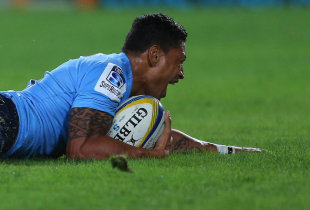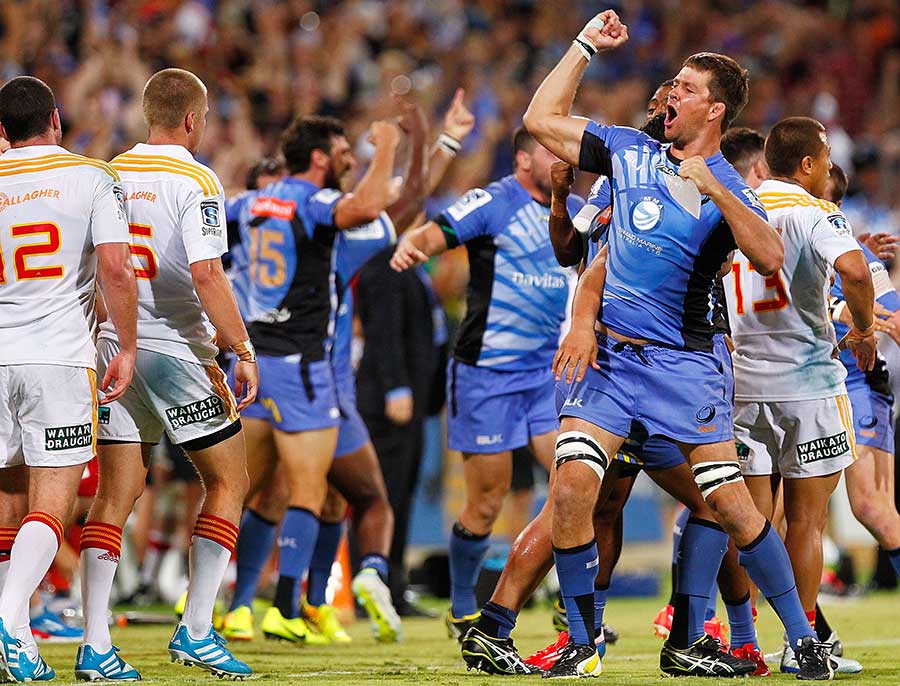|
The Growden Report
Izzy siezes the moment for Waratahs
Greg Growden
April 20, 2014

Israel Folau made an almost immediate impact against the Bulls
© Getty Images
Enlarge
After just 28 seconds, you had the answer as to why the New South Wales Waratahs were so infuriated by the Australian Rugby Union's knuckleheaded decision in forcing Israel Folau out the previous round. The Waratahs know they lose so much when Folau, their chief draw card, is not around. Suddenly they don't have a game breaker, and so with good reason they don't take kindly when the governing body loses its bearings, over-rules them and tells Folau he cannot play. At least he was back to play the Bulls - and it only took several seconds of smart footballing nous from Folau to get the Waratahs back on track, and in a position to enjoy their first win over the South African province since 2005. As usual the Waratahs began the game effectively. They kicked off, and in a well-planned concerted charge regained the ball via a tap-back by Adam Ashley-Cooper. Michael Hooper regathered, and charged towards the sideline, giving the team ample space to do something with second-phase ball. Sekope Kepu was the next to take it up, before the Waratahs decided to go wide. Quick hands involving Bernard Foley, Kurtley Beale, and Ashley-Cooper, who had sprinted to the other side of the field to get back in position, put the Waratahs in a dangerous attacking spot. Ashley-Cooper drifted right, and Folau knew exactly what to do when joining the line from fullback. Folau saw the gap on the left shoulder of Ashley-Cooper, veered left, took the pass and away he went for a clear passage to the try line. In less than half-a-minute, the Waratahs were 5-0 up. Those types of "seizing the moment" episodes can so easily win matches - and this can be added to the list. And while the Waratahs were so relieved to see Folau back, so too would be Wallabies coach Ewen McKenzie, who knows he desperately needs such intelligent attacking performers if he is to have any chance of breaking through the defensive cauldron otherwise known as Fortress All Blacks. As with last season's Super Rugby tournament, this year's competition has been dominated by stoic defence. There hasn't exactly been a glut of tries from the Australian provinces. The Brumbies currently boast the most number of tries with 22 from eight games at an average of 2.75 per match, followed by the Force 21 (2.625), Waratahs 20 (2.5), Queensland Reds 18 (2.25) and Rebels 15 (1.875). Such skinny figures are understandable, considering that the defensive structures of all teams in the competition have improved remarkably. Each Australian team has been frugal in letting in opposition tries. The Waratahs are the best gatekeepers with 13 tries scored against them, followed by Brumbies (15), Force (17), Reds and Rebels (19 each). The Rebels would be the most delighted with their improved defensive statistics, because before this season they were as useful as a levy bank made out of straw. And the most effective in this department has been the Force. The prime reason why they won five games in a row was that their first-rate defence has frustrated oppositions into error. Masterful bloodsuckers, they have relied on other teams' stupidity to survive.

The Force's success has been built on a determined defence © Getty Images
Enlarge
The Force's attack has often been non-existent, and while their inside centre Kyle Godwin is billed as the most promising attacking player in the country, all we have discovered this year is that he can tackle, and tackle and tackle. Yet the Force have avoided its attacking deficiencies being exposed by providing an effective barricade on their own line, holding out the enemy for endless minutes. And when there has been a half-chance, a dropped ball or a penalty, the Force have swooped. So many of their tries have been handed to them by an opponent under pressure making a blunder. Eventually it had to end, and it wasn't surprising it occurred when their scrumhalf Alby Mathewson wasn't around. Mathewson - the standout No. 9 in the Australian teams - is the glue to the Force team, and without him, they soon fragment. Fatigue also crept in, and the Rebels ended the dream. Grand defence is fine, but you need more. That's why, with the Test season looming, it was so comforting to see Folau running around again on the weekend. © ESPN Sports Media Ltd Join the conversation with Greg on Twitter @GregGrowden
|
Live Sports
Communication error please reload the page.
-
Football
-
Cricket
-
Rugby
-
- Days
- Hrs
- Mins
- Secs
F1 - Abu Dhabi GP
Abu Dhabi Grand Prix December 11-131. Max Verstappen ()
2. Valtteri Bottas (Mercedes)
3. Lewis Hamilton (Mercedes)
4. Alexander Albon ()
5. Lando Norris ()
6. Carlos Sainz Jr ()
-
ESPNOtherLive >>
Golf - Houston Open
Snooker - China Open
Tennis - Miami Open

